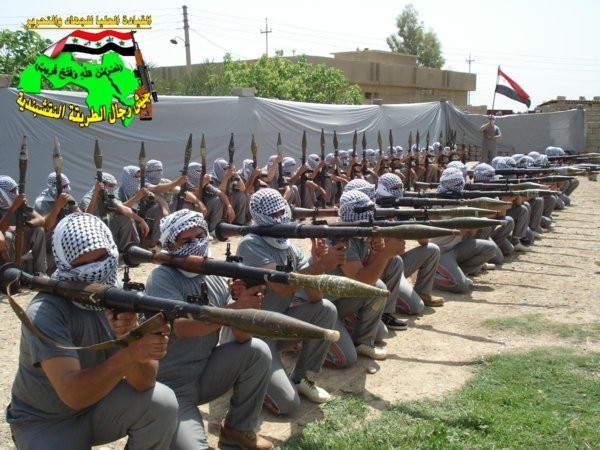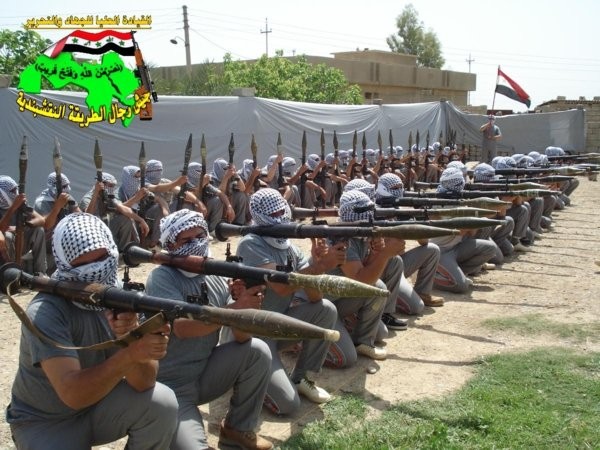By Mustafa Habib | Baghdad | (Niqash.org) | – –
It’s not only the Iraqi army gunning for the Islamic State in Mosul. The extremists’ former allies, who helped them control the city, have also declared a desire for revenge, two years after they were betrayed.
On October 17, just before dawn in Iraq, the country’s Prime Minister Haider al-Abadi declared that the battle to push the Islamic State group out of Mosul had begun. The extremist group had been in control of the city since June 2014. But two days before this announcement, another group was also declaring war on the Islamic State, or IS, group.

Members of the Naqshbandi Army.
This was the militia known as the Jaysh al-Tariqa al-Naqshbandia – or the Army of the Men of the Naqshbandi Order. This movement – which has strong links to Saddam Hussein’s outlawed Baath political party – is classified as a terrorist organization by many. The Naqshbandi Army is led by former members of the Baath party and senior officers of the former Iraqi army and is under the command of Saddam Hussein’s deputy, Izzat Ibrahim al-Douri, who is described by the New York Times as “a top military commander and a vice president in the Hussein government and one of the few prominent Baathists to evade capture by the Americans”.
In a statement issued last week, the Naqshbandi Army called upon the people of Mosul to rise up against the IS group and they warned the Shiite Muslim volunteer militias, who are poised to enter the fray in towns around Mosul, not to enter the city.
“They have the same convictions they always did. They also have the ability to organize within just a few days. So they’re waiting for their opportunity.”
The Naqshbandi Army are not the only group inside Mosul to prepare to take revenge on the IS group. There are other pockets of resistance too. Small groups with limited weapons are starting to announce their plans to fight the group. These include the so-called Prophet Yunus Brigades, the Mosul Brigades, Ahrar al-Mosul (or the Free People of Mosul) and the M movement, with M being the first letter of the Arabic word, muqawama, which means “resistance”.
Last week the group Ahrar al-Mosul announced that they had assassinated one of the IS group’s leaders, a man known as Abu al-Farouq, who was apparently responsible for managing the extremists’ spoils of war. And the Mosul Brigades claimed they had attacked a weapons storehouse. There have also been reports from the news agency, Reuters, of a coup attempt that was foiled by the IS group and which resulted in 58 executions.
But none of this can be confirmed and while the resistance groups have started to make noises about what they are doing, the locals have little faith in them as yet – they are small and not centrally organized. It’s likely they also lack weapons.
The Naqshbandi Army are quite likely to be one of the groups most worrying the IS group inside the city right now. After all, they also bear the IS group a big grudge; back in 2014, the IS group betrayed them badly.
Looking back to when the extremists first took control of Mosul just over two years ago, the IS group appeared to have formed alliances with other armed factions inside Mosul in order to take control of the city. All of these were opposed to the then-Iraqi government headed by Nouri al-Maliki and had made good use of the anger that many of the people of Mosul, with its Sunni Muslim majority population, felt towards the Shiite Muslim-led government.
An alliance was established that brought the Naqshbandi Army together with the IS group as well as with other smaller local militias, like Ansar al-Sunna, and these groups worked together against government forces to establish what would eventually became an IS stronghold.
In June 2014, locals in the city were pleased about this “revolution” against the government and when they came out onto the streets to celebrate, some carried posters of Saddam Hussein and of his red-haired, former deputy, al-Douri. A committee made up of former army officers and Baath party officials held a meeting and decided that one of their own, veteran military man, Hashim al-Jammas, who had fought in the Iran-Iraq war, should be the new mayor of the city. They even decided to ask the foreign fighters who had arrived with the IS group to leave – after thanking them for their efforts, of course. The council saw the changes in Mosul as a revolution by and for local Sunnis, not as an invasion by foreign extremists.
However the IS group surprised all of their co-conspirators on the morning of Friday, June 13, 2014, when it refused the council’s requests and asked all other factions to swear allegiance to it, or to withdraw and hand over their weapons, under threat of death.
The IS group began to target members of the other armed militias, especially those belonging to the Naqshbandi Army, Ansar al-Sunna and the Salahaddin Brigades, who were united in their refusal to swear allegiance to the IS group.
And over the past two years, the IS group has continued to arrest or kill any individual associated with the Naqshbandi Army, the former Baath party or the former Iraqi army. A few weeks ago dozens of retired soldiers were arrested by the group and their fate remains unknown.
Unlike in the provinces of Anbar and Salahaddin the members of militias like the Naqshbandi Army in Mosul were organized and disciplined; their members and leaders were army veterans. Whereas in those central Iraqi provinces, the militias tended to be led by clerics who relied on tribal allegiances and fighters. Additionally, Mosul is not a city that runs on tribal loyalties, like so many others in Iraq. Locals tend to be loyal to a certain organization or party, rather than a clan.
This is part of the reason that the US was unable to encourage locals to form their own anti-extremist fighting groups in Mosul, as they did in Anbar, Salahaddin and Diyala. The men who might resist were not as faithful to family ties as they were elsewhere; every single one had to be persuaded, rather than just one or two tribal leaders.
As the fighting for the city has started, it is clear that the IS group is increasingly paranoid about potential soldiers inside the city.
With good reason, says Mohammed Nouri, an MP from Mosul. There is some coordination between the city’s internal resistance and the Iraqi security forces and the international coalition conducting airstrikes in Iraq, he confirms.
“Despite the risks and the fact they are not well armed, there are many individuals inside Mosul resisting the IS group,” he told NIQASH. They have made many sacrifices as the IS group arrests and kills them to frighten others away from resistance.”
“There will be further coup attempts when the Iraqi army reaches the outskirts of Mosul,” suggests Abu Qais al-Jibouri, a former member of the Baath party and former leader in the Naqshbandi Army, who joined the government’s reconciliation project three years ago and now provides analysis and information on extremist groups. “The factions in Mosul belonging to the Baath party and to the Naqshbandi Army are powerless at the moment and they are being harassed and terrorized by the IS group. But they are waiting for the right opportunity to act.”
“They still have the same convictions and ideology they always did,” al-Jibouri told NIQASH. “They also have the ability to organize within just a few days. So they’re waiting for the collapse of the extremist group so they can get to the weapons stores to arm themselves and so they can start to take revenge on the IS group, which turned against them two years ago.”
Still, al-Jibouri cautions, these smaller groups inside Mosul may not be the trusted allies the Iraqi government needs in the northern city. They may well turn against the government again in the near future.
For one thing, it is clear that most of the members of the IS group in Mosul are Iraqis and that many are actually former members of the Iraqi army under Saddam Hussein. Their primary goal is power, al-Jibouri notes. They left the organization, Al Qaeda in Iraq, took some theology lessons and then became part of the IS group – and many say they did this for their own ends, not because they believe firmly in religious law or the fantastical ideology the IS group espouses. Hundreds of these kinds of individuals joined the IS group and if things start to look grim in Mosul, they will simply fade back into their families and civilian life and wait for the next opportunity, al-Jibouri suggests.
The lack of trust goes both ways. The smaller armed groups inside Mosul may well be preparing for the IS group’s demise. But they also remain reluctant to cooperate fully with the Iraqi government forces. They worry that the same thing that happened to those Iraqis who cooperated with the US to fight Al Qaeda will happen to them, once the battle has finished. Under former Prime Minister Nouri al-Maliki, those Sunni Iraqis who turned against Al Qaeda never received any of the things that they were promised, such as money, security and being absorbed into the official armed forces.
Via Niqash.org



 © 2025 All Rights Reserved
© 2025 All Rights Reserved